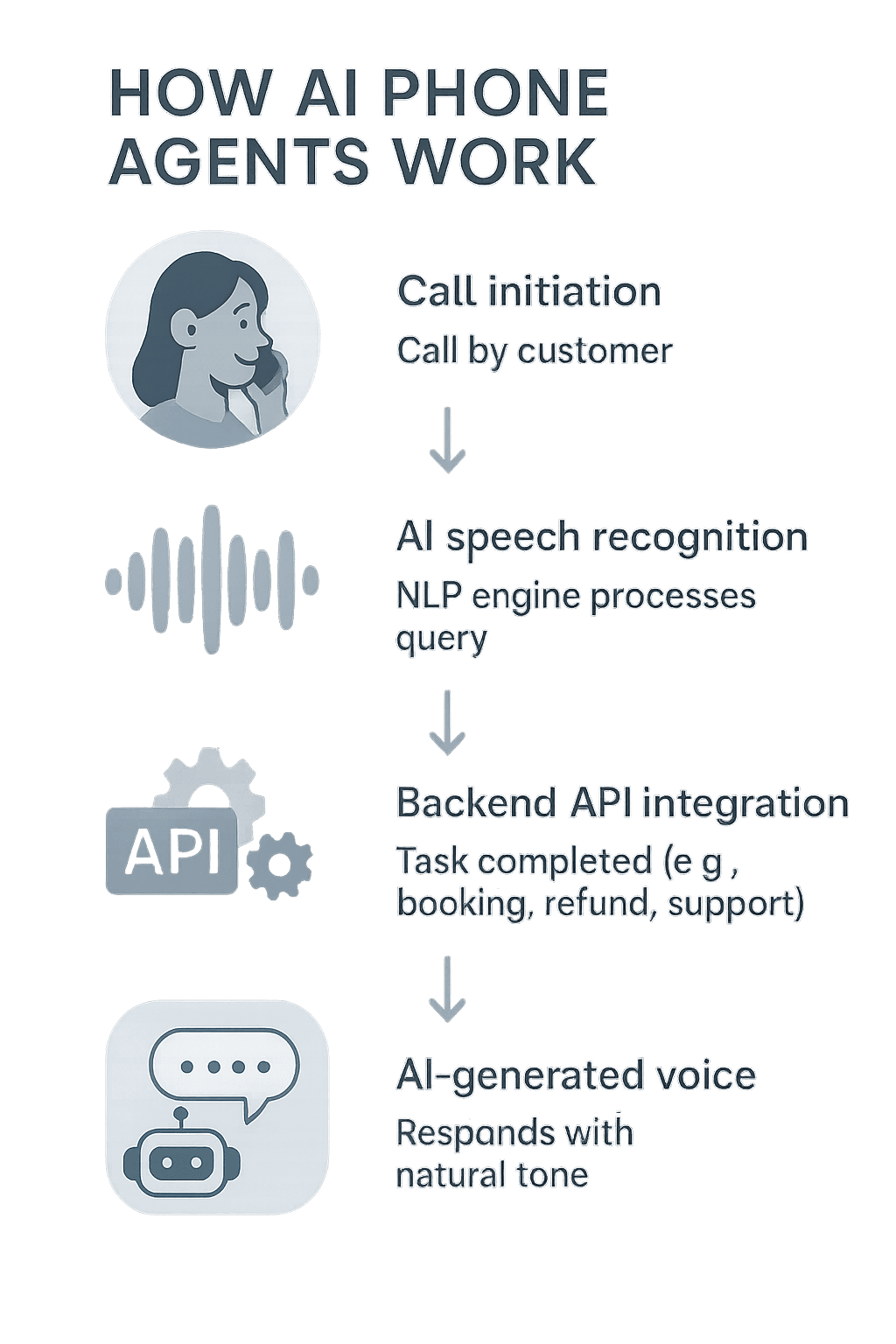Discover how AI phone agents use voice automation, NLP, and machine learning to enhance customer service and streamline operations.

Prithvi Bharadwaj
Updated on
January 27, 2026 at 10:07 AM

AI Phone Agents: Transforming Customer Communication

Think about the last time you were stuck on hold, waiting for a customer support rep. It probably wasn’t a great experience. Long wait times, scripted answers, and bouncing between departments have made traditional call centers frustrating for both customers and businesses alike. But a quiet revolution is changing that—AI phone agents are stepping in to reimagine how businesses connect with their customers.
Powered by large language models (LLMs), these AI agents can handle thousands of calls at once, respond naturally, solve real problems, and do it all without getting tired. It’s not just automation—it’s intelligent communication at scale.
Let’s break down what AI phone agents are, how they work, and why they’re becoming the go-to solution for forward-thinking companies.
What are AI Phone Agents?
AI phone agents are virtual assistants that interact with customers via phone, simulating real human conversations. Unlike traditional auto-dialers or interactive voice response (IVR) systems that give you rigid options ("Press 1 for sales, 2 for support.."), AI phone agents can actually talk to people in natural language. They understand what callers say, figure out what they mean, and respond in a helpful, human-like manner.
These systems don’t rely on pre-written scripts. Instead, they use natural language processing (NLP) and machine learning to understand tone, context, and intent. That means they can have fluid, two-way conversations that feel far more human than robotic.
And here’s the game-changer: they’re always on. Whether it’s 2 PM or 2 AM, these agents can handle thousands of conversations simultaneously—without ever putting someone on hold.

How AI Phone Agents Transform Communication
Across industries—from healthcare to real estate, e-commerce to finance—AI phone agents are becoming integral to how businesses manage customer communication. Here's how they're shaking things up:
1. Scalable Outreach Without Compromise
AI phone agents allow businesses to reach out to hundreds or even thousands of leads simultaneously, without sacrificing the quality of the interaction. Need to remind patients about appointments, follow up on leads, or re-engage lapsed customers? These virtual agents can do all that, without ever needing a coffee break.
2. Smarter Customer Service
AI phone agents can access and interpret data from CRMs or support platforms in real-time. So when a customer calls with a question about their order, the AI doesn’t just respond—it looks up the customer’s history, preferences, and past interactions to give a personalized answer.
3. Reduced Operational Costs
Hiring, training, and managing human call center staff is expensive. With AI, businesses significantly reduce their reliance on large teams while still maintaining (or even improving) customer experience. It’s a win-win: happier customers and leaner operations.
How Speech Recognition AI Works
If you're wondering how an AI phone agent can talk like a human and understand all kinds of questions on the fly, here’s a quick breakdown of the tech stack behind the scenes:
1. Speech Recognition & Voice Processing
When someone calls, the AI first listens and converts their voice into text using speech recognition technology. This is the foundation for understanding what the caller is saying.
2. Natural Language Understanding (NLU)
Next, the AI analyzes the text input. It looks at the context, tone, and intent. Is the caller frustrated? Are they asking about a billing issue or product features? This step is critical in ensuring the AI “gets” what the caller really wants.
3. Decision-Making with Machine Learning
Based on what it understands, the AI references past interactions, business rules, or customer data to decide how to respond. Over time, it gets better at this by learning from every call.
4. Text-to-Speech (TTS)
Once the response is ready, the system uses TTS technology to speak it out loud in a natural, friendly tone. Some systems even allow for tone variation, accents, and personality customization.
5. Task Automation
Finally, if an action is needed—like rescheduling an appointment or sending a payment link—the AI handles it directly, without needing a human to step in.
Key Features That Set AI Phone Agents Apart
AI phone agents aren’t just answering calls—they’re fundamentally changing how businesses operate. Here are the standout features that make them so powerful:
1. Conversational AI
Forget robotic responses. These agents can interpret tone, context, and subtle cues in conversation. They can handle interruptions, clarify questions, and even inject a bit of humor if appropriate.
2. CRM Integration
AI phone agents connect with existing software—Salesforce, HubSpot, Zendesk, etc.—to pull up real-time information and update customer profiles on the fly. No need to repeat yourself multiple times.
3. AI-Driven Analytics
With every call, the system collects valuable data. How often are certain questions asked? Where are conversations getting stuck? Which types of leads convert best? These insights help businesses fine-tune their strategy.
4. Multilingual Support
AI agents can understand and speak multiple languages, breaking down communication barriers and opening new markets—no translators or call center outsourcing needed.
Real-World Benefits
Let’s talk outcomes. Here’s how AI phone agents are delivering real value:
1. Increased Efficiency
These systems don’t need breaks, training, or sleep. They can handle thousands of conversations simultaneously, which means higher throughput and faster resolution times—especially during peak periods.
2. Always-On Availability
Customers can call anytime and get immediate help—nights, weekends, holidays. That kind of 24/7 support builds trust and loyalty without extra headcount.
3. Better Lead Generation
AI phone agents don’t just talk—they qualify. By asking smart, relevant questions, they can identify high-intent leads and route them directly to your sales team, saving time and boosting conversion rates.
4. Personalized Experiences
Since AI phone agents can tap into customer history and behavior, every conversation feels tailored. It's like talking to someone who already knows you—because in a way, they do.
5. Lower Costs, Higher ROI
By reducing labor costs and increasing productivity, companies are seeing a measurable return on investment. What once required a full call center team can now be handled by a handful of AI agents.
Conclusion
AI phone agents are transforming customer interactions by reducing costs, providing human-like conversations, and offering seamless multilingual support. As these technologies evolve, they enable businesses to scale effortlessly while enhancing customer experiences.
References
1. Research Papers & Academic Sources:
Jurafsky, D., & Martin, J. H. (2021). Speech and Language Processing (3rd ed.). Stanford University Press.
Deng, L., & Li, X. (2013). "Machine Learning Paradigms for Speech Recognition: An Overview." IEEE Transactions on Audio, Speech, and Language Processing.
Zhang, Y., et al. (2019). "Conversational AI and Virtual Agents: Advancements in AI-Powered Customer Support." Journal of Artificial Intelligence Research.
2. Industry Reports & Whitepapers:
Gartner. (2024). The Future of AI in Customer Support and Call Centers. Retrieved from www.gartner.com
McKinsey & Company. (2023). How AI-Powered Virtual Agents Are Changing Customer Service. Retrieved from www.mckinsey.com
IBM Research. (2024). AI and NLP in Business Communication. Retrieved from www.ibm.com
3. Technology & Business News Sources:
Forbes. (2024). "How AI Phone Agents Are Transforming Customer Support." Retrieved from www.forbes.com
Harvard Business Review. (2024). "The Role of AI in Enhancing Customer Experience." Retrieved from www.hbr.org
MIT Technology Review. (2023). "AI and Automation: The Future of Call Centers." Retrieved from www.technologyreview.com
4. AI & NLP Technology Providers:
OpenAI. (2024). The Role of Large Language Models in AI Phone Agents. Retrieved from www.openai.com
Google AI. (2024). Advancements in NLP for AI-Powered Call Centers. Retrieved from www.ai.google
Amazon AWS AI. (2024). AI Chatbots and Voice Assistants for Business Operations. Retrieved from www.aws.amazon.com
5. Regulatory & Ethical Guidelines:
European Commission. (2023). AI Regulations and Ethical Considerations in Customer Support. Retrieved from www.europa.eu
U.S. Federal Trade Commission (FTC). (2024). AI, Consumer Protection, and Automated Call Centers. Retrieved from www.ftc.gov

Automate your Contact Centers with Us
Experience fast latency, strong security, and unlimited speech generation.
Automate Now


